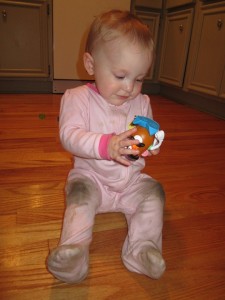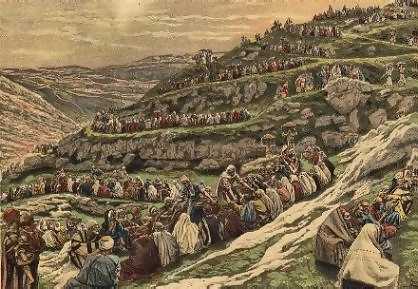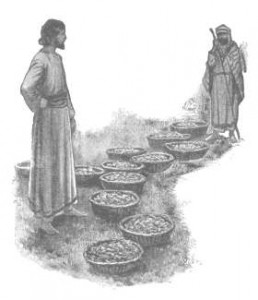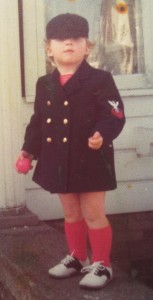Little Emerald is 11 months now, and though she can’t talk, she’s been communicating the same message since she began crawling a few weeks ago: “Clean your floors, Grandma Midgee.”
Taking advantage of her new mobility, she’s been investigating every corner of my cottage on hands and knees, a cleaning crew of one. But instead of swinging a broom or swiping a Swiffer, she just uses her clothes.
 This morning while Birgitta was at school, Emerald and I worked on several projects in the basement. Although I sat her down next to a bin of toys, she quickly flipped to mobile-mode, resuming her floor-cleaning program. In just a few minutes her hands, knees and toes were black with who-knows-what, and at that point we abandoned the basement and headed upstairs to clean up.
This morning while Birgitta was at school, Emerald and I worked on several projects in the basement. Although I sat her down next to a bin of toys, she quickly flipped to mobile-mode, resuming her floor-cleaning program. In just a few minutes her hands, knees and toes were black with who-knows-what, and at that point we abandoned the basement and headed upstairs to clean up.
Until Emerald began crawling, I had no idea my floors were as dirty as they were. It took “contaminating her” to let me know.
Isn’t that similar to what Jesus did for our filthy sins?
 While on the cross, he willingly “crawled through” the sin-contamination of all mankind, letting every sin from every person, past, present and future, dirty him through and through. Scripture tells us he “became” our sin. How can we not sit up and take notice of how dirty he became, just so we wouldn’t have to be?
While on the cross, he willingly “crawled through” the sin-contamination of all mankind, letting every sin from every person, past, present and future, dirty him through and through. Scripture tells us he “became” our sin. How can we not sit up and take notice of how dirty he became, just so we wouldn’t have to be?
Then, after Jesus rose from the dead, everything changed. He conquered sin and therefore could become pure again himself, as he had been before he picked up all our filth. His suffering was “once for all,” after which he could freely offer an eternal clean slate to all of us.
So then why do we continue to suffer from guilt over our own sin? It’s because we’re shocked by the blackness of it, just like I was surprised to see Emerald’s filthy clothes. But as we turn from our “dirty deeds” and ask forgiveness, recommitting ourselves to live for Christ, God no longer sees our dark smudges, all because of Jesus. Our sins have been deep-sixed into the sea, and we can enjoy release from the heavy darkness of guilt. What a beautiful cleansing system our Lord has!
- I lay my sins on Jesus, the spotless Lamb of God;
- He bears them all and frees us from every guilty load.
- I bring my guilt to Jesus, to wash my crimson stains
- White in His blood most precious, ‘til not a spot remains.
(Horatius Bonar)
I’ve made a concentrated effort to get the dirty stains out of Emerald’s pink clothes, but even my best scrub brush and a combination of chemicals have left telltale smudges related to the blackness that used to be.
How glorious that when Jesus goes about forgiving even the darkest of sins, he does it all the way to spotless.
“Come now, let us settle the matter,” says the Lord. “Though your sins are like scarlet, they shall be as white as snow.” (Isaiah 1:18)
I lay my sins on Jesus, the spotless Lamb of God;
He bears them all and frees us from every guilty load.
I bring my guilt to Jesus, to wash my crimson stains
White in His blood most precious, ‘til not a spot remains.
(Horatius Bonar)






